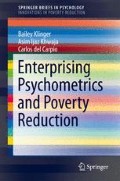Abstract
This chapter examines the relationships between psychometric assessments and the entrepreneur's business performance (profits) and credit risk (default). Regarding the Big Five personality traits, extroversion is found to be strongly related to higher profit levels, with weaker relationships for agreeableness (positive) and conscientiousness (negative). Interestingly, integrity is found to have a weak negative relationship with profits: the most honest entrepreneurs aren't the most honest. Conversely, when considering default risk, the lowest-risk entrepreneurs also tend to score higher on the integrity assessment, as well as register higher levels of conscientiousness. Digit span (fluid intelligence), controlling for level of education, is negatively related to profit levels, but is not related to default risk. When combined, these relationships with conscientiousness, honesty, and level of education have an AUC (a common metric of credit score predictive power) of 0.57–0.66, which is not extraordinarily strong when compared to credit scoring models in high-information countries and market segments, but it is sufficient to add significant value to the risk analysis task facing banks lending to SMEs in emerging markets. We show that for one of the sample banks, risk of default for low-scoring clients is 50 % higher than it is for high-scoring clients. Furthermore, we show that these results can be improved by customizing models to each country and financial institution, which isn't surprising given the cultural differences between Peru, Colombia, Kenya and South Africa. While traditional methods of model building suffer challenges of doing this customization without large amounts of data, new methodologies such as Bayesian methods are shown to offer promise to improve results even further, making customization without over-fitting possible and further strengthening the case for using psychometric tools for credit risk analysis.
Access this chapter
Tax calculation will be finalised at checkout
Purchases are for personal use only
References
Caliendo, M., & Kritikos, A. (2012). Searching for the entrepreneurial personality: new evidence and avenues for further research. Journal of Economic Psychology (Special Issue Editorial), 33(2), 319–324.
Ciavarella, M., Buchholtz, A., Riordan, C., Gatewood, R., & Stokes, G. (2004). The Big Five and venture survival: Is there a linkage? Journal of Business Venturing, 19, 465–483.
De Mel, S., McKenzie, D., & Woodruff, C. (2008). Returns to capital in microenterprises: evidence from a field experiment. The Quarterly Journal of Economics, 123(4), 1329–1372.
Djankov, S., Miguel, E., Qian, Y., Roland, G., & Zhuravskaya, E. (2005). Who are Russia’s entrepreneurs? Journal of the European Economic Association, 3(2–3), 587–597.
Djankov, S., Qian, Y., Roland, G., & Zhuravskaya, E. (2007). What makes a successful entrepreneur? Evidence from Brazil. Russia: Center for Economic and Financial Research Working Paper 0104.
Holland, J. (1985). Making vocational choices. A theory on vocational personalities and work environments. Englewood Cliffs, NJ: Prentice-Hall.
Schmitt, D., Allik, J., McCrae, R., & Benet-Martinez, V. (2007). The geographic distribution of big five personality traits. Journal of Cross-cultural Psychology, 28(2), 173–212.
Zhao, H., & Seibert, S. (2006). The Big Five personality dimensions and entrepreneurial status: a meta-analytical review. Journal of Applied Psychology, 91(2), 259–271.
Author information
Authors and Affiliations
Rights and permissions
Copyright information
© 2013 The Authors
About this chapter
Cite this chapter
Klinger, B., Khwaja, A.I., del Carpio, C. (2013). Results and Discussion. In: Enterprising Psychometrics and Poverty Reduction. SpringerBriefs in Psychology(). Springer, New York, NY. https://doi.org/10.1007/978-1-4614-7227-8_4
Download citation
DOI: https://doi.org/10.1007/978-1-4614-7227-8_4
Published:
Publisher Name: Springer, New York, NY
Print ISBN: 978-1-4614-7226-1
Online ISBN: 978-1-4614-7227-8
eBook Packages: Behavioral ScienceBehavioral Science and Psychology (R0)

